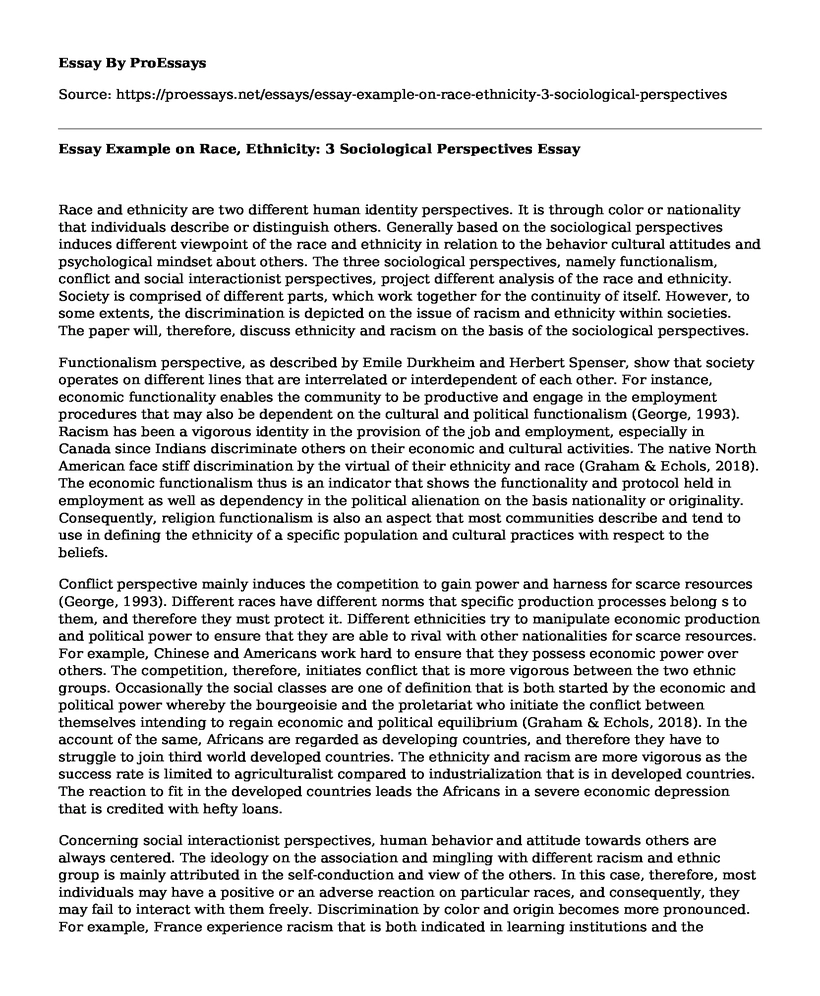Race and ethnicity are two different human identity perspectives. It is through color or nationality that individuals describe or distinguish others. Generally based on the sociological perspectives induces different viewpoint of the race and ethnicity in relation to the behavior cultural attitudes and psychological mindset about others. The three sociological perspectives, namely functionalism, conflict and social interactionist perspectives, project different analysis of the race and ethnicity. Society is comprised of different parts, which work together for the continuity of itself. However, to some extents, the discrimination is depicted on the issue of racism and ethnicity within societies. The paper will, therefore, discuss ethnicity and racism on the basis of the sociological perspectives.
Functionalism perspective, as described by Emile Durkheim and Herbert Spenser, show that society operates on different lines that are interrelated or interdependent of each other. For instance, economic functionality enables the community to be productive and engage in the employment procedures that may also be dependent on the cultural and political functionalism (George, 1993). Racism has been a vigorous identity in the provision of the job and employment, especially in Canada since Indians discriminate others on their economic and cultural activities. The native North American face stiff discrimination by the virtual of their ethnicity and race (Graham & Echols, 2018). The economic functionalism thus is an indicator that shows the functionality and protocol held in employment as well as dependency in the political alienation on the basis nationality or originality. Consequently, religion functionalism is also an aspect that most communities describe and tend to use in defining the ethnicity of a specific population and cultural practices with respect to the beliefs.
Conflict perspective mainly induces the competition to gain power and harness for scarce resources (George, 1993). Different races have different norms that specific production processes belong s to them, and therefore they must protect it. Different ethnicities try to manipulate economic production and political power to ensure that they are able to rival with other nationalities for scarce resources. For example, Chinese and Americans work hard to ensure that they possess economic power over others. The competition, therefore, initiates conflict that is more vigorous between the two ethnic groups. Occasionally the social classes are one of definition that is both started by the economic and political power whereby the bourgeoisie and the proletariat who initiate the conflict between themselves intending to regain economic and political equilibrium (Graham & Echols, 2018). In the account of the same, Africans are regarded as developing countries, and therefore they have to struggle to join third world developed countries. The ethnicity and racism are more vigorous as the success rate is limited to agriculturalist compared to industrialization that is in developed countries. The reaction to fit in the developed countries leads the Africans in a severe economic depression that is credited with hefty loans.
Concerning social interactionist perspectives, human behavior and attitude towards others are always centered. The ideology on the association and mingling with different racism and ethnic group is mainly attributed in the self-conduction and view of the others. In this case, therefore, most individuals may have a positive or an adverse reaction on particular races, and consequently, they may fail to interact with them freely. Discrimination by color and origin becomes more pronounced. For example, France experience racism that is both indicated in learning institutions and the political institution. Blacks are often disregarded and discriminated from whites due to the norms that were induced during slavery times (Graham & Echols, 2018). Interactions, therefore, are always minimal under such community.
Based on the Sociological perspectives, society is a body with many parts that work in unity to achieve the purpose. The parts or rather the components of the community interdepends on in each other in the development of itself. However, due to elements of the color differences and nationality, some discriminative hiccups arise in the functionality as well as social interaction. Generally, racism pops in the community to limit others by terming a particular race or ethnic group superior. Hence, the conflict to survive in such context commences leading to the antagonism of the races and ethnic groups. Therefore, it from that dimension that sociological perspective affects racism and ethnicity.
References
George, L. K. (1993). Sociological perspectives on life transitions. Annual review of sociology, 19(1), 353-373. https://www.annualreviews.org/doi/abs/10.1146/annurev.so.19.080193.002033
Graham, S., & Echols, L. (2018). Race and ethnicity in peer relations research. https://psycnet.apa.org/record/2018-00748-030
Cite this page
Essay Example on Race, Ethnicity: 3 Sociological Perspectives. (2023, May 23). Retrieved from https://proessays.net/essays/essay-example-on-race-ethnicity-3-sociological-perspectives
If you are the original author of this essay and no longer wish to have it published on the ProEssays website, please click below to request its removal:
- Course Work Example: Communication in the Workplace
- Famous Teen Counseling: The Teen Star Paper Example
- Low Socioeconomic Status Compromises the Brain Development - Essay Sample
- Essay Sample on Teaching Social Skills to Improve Education and Parenting
- Article Review Example on Closing the Orgasm Gap in Heterosexual Relationships
- Paper Example on Patients' Communication: Improving Quality of Care at Torin Regional Hospital
- The Politics of Race Are Shifting, and Politicians are Struggling to Keep Pace







